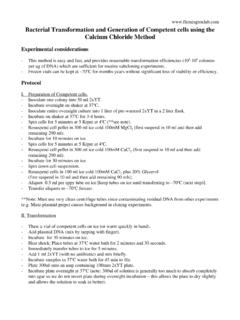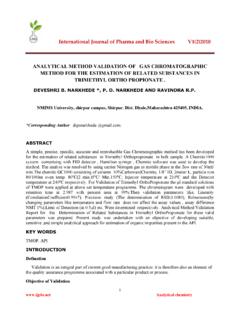Transcription of SPEAKING IN E-PRIME: An Experimental Method …
1 SPEAKING IN E-PRIME: An Experimental Method forIntegrating General SemanticsE. W. KELLOGG III*into Daily LifeIFIRST READ ALFRED KORZYBSKI'sScience and Sanityin 1976, and had feltdeeply impressed by the manifest validity and comprehensive character ofhis work on non-aristotelian thinking. (1) Even so, I at first had very little successin incorporating the insights gained into my daily life. The principles seemedso transparently obvious in hindsight ("the map is not the territory, "the wordis not the thing, the repeal of "the law of the excluded middle;" etc.), that Imade the common beginner's error of assuming that simply readingaboutgeneral semantics would train one in theuse ofgeneral semantics.
2 Althoughsome books proved very helpful to me (in particular Ken Keyes'How To DevelopYour ThinkingAbiliry,with those delightful and singularly apropos cartoonsby Ted Key), it seemed clear that having an intellectual understanding of non-aristotelian thought does not necessarily allow one to practice it. (2)I began a self-training program in which I focused on practically applyinga single aspect of general semantics on any given day. For example, I mightfocus on the multiordinality of terms, and make a serious effort to increase myawareness of the orders of abstraction inherent in what I read, said, and heardduring my daily activities. On another day I might try to eliminate the either-or,all-or-never orientation by thinking more in terms of possibilities and proba-bilities.
3 As I gained experience, I found some small, but significant, changesin my "mental machinery" resulting from my self-training efforts, includingan increasing number ofspontaneousinstances of non-aristotelian so, these efforts proved mostly ineffectual, as I continued to habituallythink and evaluate in the old aristotelian way. Clearly, I needed a simple, butcomprehensive system of discipline that would force me to incorporate the var-ious principles of general semantics into daily I had almost given up on finding such a discipline, I discovered Bourlands' article, "A Linguistic Note: Writing in E- prime ; in a back issueof the General Semantics Bulletin. (3) In essence, the term E- prime (abbreviated E) refers to an English language derivative that eliminates any* Dr.
4 Kellogg works as the Research Director of the Aletheia Foundation (1809 N. Highway99, Ashland, Oregon 97520).118 SPEAKING IN E- prime 119use of the verb "to be" (basically am, is, was, are, and were). In this articleBourland argued for the use of E' as a writing discipline that allows one tominimize many "false to facts" linguistic patterns inherent in ordinary Englishusage. Without going deeply into the advantages of E' at this point, its use auto-matically eliminates the false to facts "is of identity" ( is a man) andthe "is of predication"( leaf is green), two main stumbling blocks tonon-aristotelian thinking. I decided to make E' an integral part of my self-training efforts. If I couldn't consistentlyactin accordance with general seman-tics principles I could at leastwritein accordance with them!
5 At first, my writing in E' sounded stilted and contrived, and I had to writefirst drafts in ordinary English, and then laboriously translate them. I usedE' exclusively in my personal writing, and soon gained enough facility thatI wrote, albeit awkwardly, first draft versions in it. Fortunately, at this pointin my career I had the task of writing my dissertation. The exercise of writingthe first draft in E- prime gave me a practical and personally convincing demon-stration of the potential power of E' as a catalyst and clarifier of thought. Theuse of E' clarified many aspects of my Experimental work, and made obviousmany inherent assumptions that ordinary English usage had the final version did not make exclusive use of E' (I wrote too awk-wardly in it for that), I had gained a great deal of experience in writing in E;and solid confirmation of its value as a tool in promoting the next few years I wrote exclusively in E' in both personal and profes-sional communications.
6 As I gained experience, I found it easier to expressmyself, until I reached the point where writing in E' felt more natural for methan writing in ordinary English. During the summer of 1978, after explain-ing the value of E' to a few acquaintances, one of them asked me why I didn'tspeakin E' if I felt so strongly about its value as a tranformational tool. I real-ized that I no longer had a satisfactory answer to that question. When I hadoriginally begun writing in E; I had found it so difficult that I had not evenconsidered the possibility of SPEAKING in it, but in 1978 this situation no longerapplied. Writing in E' had already proved itself to me many times over as avaluable training discipline in non-aristotelian thinking.
7 Would not speakingin E' prove far more valuable?Haltingly, and with many mistakes and errors, I began the task of learningto speak in does E- prime work?At this point, it seems appropriate to give a fuller explanation of how E-primemight work. In his book,Language,Thoughtand Reality,Benjamin Lee Whorfgives numerous examples of languages and cultures that support his "princi-ple of linguistic relativity" (4) This principle states that the structure of thelanguage you use influences the way you perceive "reality;" as well as how youbehave with respect to that perceived reality. Although one could describe E'120 Et cetera SUMMER 1987simply as English without any use of the verb "to be, such a definition missesthe profound changes in personal orientation resulting from such a , E - prime consists of a more descriptive and extensionally orientedderivative of English,thatautomatically tends to bring the user back to the example, if you saw a man, reeking of whisky, stag-ger down the street and then collapse, you might think (in ordinary English)"He is drunk:" In E' one would think instead "He acts drunk.
8 " or "He looksdrunk," both of which statements obviously coming closer to an accuratedescription of the actual experience, and involving fewer covert assumptionsthan the English original. After all, one might have encountered an actor (prac-ticing the part of a drunken man), a man who had spilled alcohol on himselfundergoing a seizure of some kind, etc., etc. The E' statement still leaves thesepossibilities open, whereas the "is" statement does not. Although E' usuallyreduces hidden assumptions, it does not exclude them (for example, you mayhave seen a woman, or a robot, or an alien, etc. that looked like a man and acteddrunk). E- prime fosters a worldview in which the user perceives situations aschangeable rather than static, and where verbal formulations derived fromexperience indicate possibilities rather than certainties.
9 Subjectively, I havefound my creativity greatly enhanced, as many problems that"areunsolvable"in ordinary English only"seemunsolvable' in E'! This shift in attitude canmake a great , removing the "to be" verb from English results in a language of a morephenomenological character, in that this change automatically causes a reduc-tion of the number of assumptions in even simple sentences. Statements madein E' almost always mirror first person experience far more adequately thanthe "is" statements they replace. E' also greatly encourages one to use the activevoice ("Smith, did it") rather than the often misleading and information-poorpassive voice ("it was done"). Of course, as Bourland pointed out, one can con-tinue the modification of E- prime even further, adding for example the alter-ations and non-aristotelian tools that Korzybski recommended (dating, index-ing, etc.)
10 , bringing one to Ek. My own version of E' (Ep) aims at aphenomenological ideal, of ever more adequately representing the territory ofmy experience while ever more clearly communicating with I can make the potential advantages of such a phenomenologicalapproach clearer by drawing an analogy with computer languages. Computersoperate with a variety of different programming languages, but these differtremendously in their efficiency and inherent versatility. A beginner usuallylearns to program using BASIC, a computer language that most resemblesEnglish, which makes it easy to learn and so initially the most convenient lan-guage to use. But the novice programmer pays a price in using BASIC, in thatthe computer has to translate BASIC into the "machine language" it uses inprocessing information, and which actually corresponds to the "computer'sexperience.








